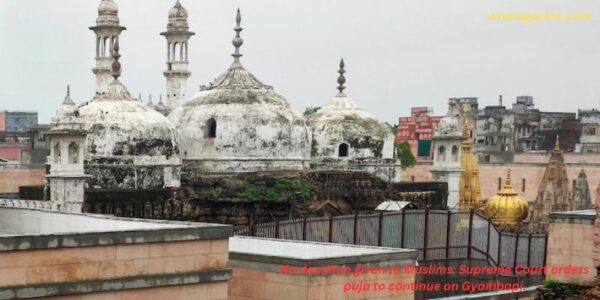The Anjuman Intezamia Masjid Committee has filed a Muslims petition against a Varanasi court’s decision to permit Hindu devotees to worship in the sealed basement of the Gyanvapi mosque complex. However, the Allahabad High Court denied the committee’s request for relief on Friday.
Also Read: well health tips in hindi wellhealth
A single bench of Justice Rohit Ranjan Aggarwal instructed the Advocate General to ensure law and order inside and outside the Gyanvapi mosque. The next hearing for the case is scheduled for February 6. The mosque committee had previously filed a Supreme Court petition challenging a district judge’s decision to allow prayers in the southern cellar of the Gyanvapi mosque.
The mosque committee approached the Allahabad High Court, where senior attorneys SFA Naqvi and Puneet Gupta represented them. They informed the court that the Hindu side was seeking access to one of the four cellars, specifically the Vyas Ka Tekhana (cellar), for prayer.
The Muslim side claimed that on January 17, when a District Magistrate was appointed as a “receiver” for that section of the mosque, an application submitted by the Hindu side was approved. However, the Hindu side’s advocate, Muslims Vishnu Shankar Jain, refuted the mosque committee’s petition, stating that they had not contested the orders from January 17 or January 31.
The High Court ruled that the mosque committee did not contest the January 17 order and did not oppose the district court’s decision to allow prayers on the Gyanvapi mosque grounds, thereby denying any relief. The decision came days after four female petitioners moved the Supreme Court requesting an excavation and survey of the sealed portion of the mosque.
The Archaeological Survey of India (ASI) report, claiming the existence of a Hindu temple before the Gyanvapi mosque, prompted the top court to consider the plea. Some Hindu activists dispute the claim that a temple once stood at the disputed site and was destroyed in the 17th century by the Mughal emperor.
In response, the Muslims side’s letter to the Supreme Court alleged collusion between the administration and Hindu petitioners, aiming to prevent the mosque managing committee from exercising their legal remedies against the court order.
See also : Wellhealth Ayurvedic Health Tips
The court’s decision allowing Hindu devotees to worship in the Gyanvapi mosque’s enclosed basement was cited as evidence of this collusion. The court also instructed the Shri Kashi Vishwanath Temple Trust to designate a priest for the “puja” and directed the district administration to arrange necessary logistics for the devotees to perform the worship.
